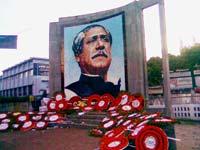Send the ‘assassin’ home Bangladesh tells Canada

The Bangladesh government has once again written to the US and Canada to hand over the killers of its founding president, Sheikh Mujibur Rahman.
The letters were sent last week by Bangladesh foreign minister Dipu Moni to her counterparts - secretary of state Hillary Clinton and Canadian foreign affairs minister John Baird, director general of the external publicity wing Mohammad Shamim Ahsan told media in Dhaka.
Ahsan said the letters have been sent to Bangladeshi missions in Washington and Ottowa by fax, and those would be handed over to proper authorities in the respective ministries, along with notes.
Sheikh Mujibur Rahman and his family were brutally killed in Aug 1975 by some army officials, and out of the 12 convicted, five were hanged in 2010, one died and six are on the run.
One death sentenced convict Lt Col (retd) M Rashed Chowdhury is now in the US, while another Noor Chowdhury lives in Toronto Canada.
They were all sentenced to death in April 2001 in trials that Amnesty International reportedly declared were fair and unbiased.
Interpol has also issued a warrant of arrest against them.
The Canadian government has opted not to deport Chowdhury.
His refugee claims have been rejected and he is technically under a deportation order. But Ottawa does not extradite those facing execution overseas after Canada’s Supreme Court ruled in 2001 that it could not extradite fugitives without obtaining assurances they would not be executed.
Chowdhury continues to be on the deportation list, and is required to report to the Canada Border Agency every week. He maintains a very low profile and has consistently refused to speak to the media.
After Sheikh Mujibur Rahman’s daughter, Sheikh Hasina Wazed, became the Bangladesh prime minister, her administration started criminal proceedings against Chowdhury and 10 others.
Chowdhury was then Bangladesh’s senior diplomat in Hong Kong and was asked to return to his country but he escaped from Hong Kong and entered Canada
During his trial in Bangladesh, the court heard Chowdhury was part of a cadre of junior officers who had conspired to assassinate Mujib and install a military-backed leader in his place.
Chowdhury, who had recently left the military, had joined the plot only two days before the assault on Rahman’s house in 1975.
He reportedly unleashed a burst of fire from his Sten gun which killed Rahman triggering an all-out massacre of the family.
Some 21 of Rahman’s relatives and employees were killed that day.









